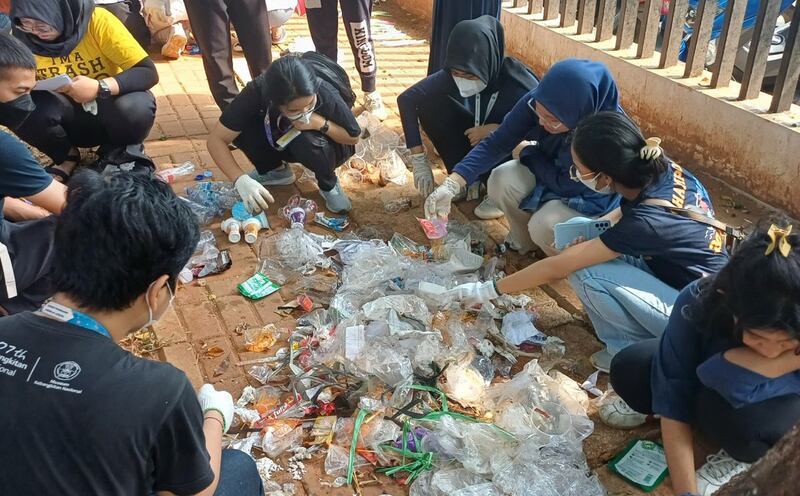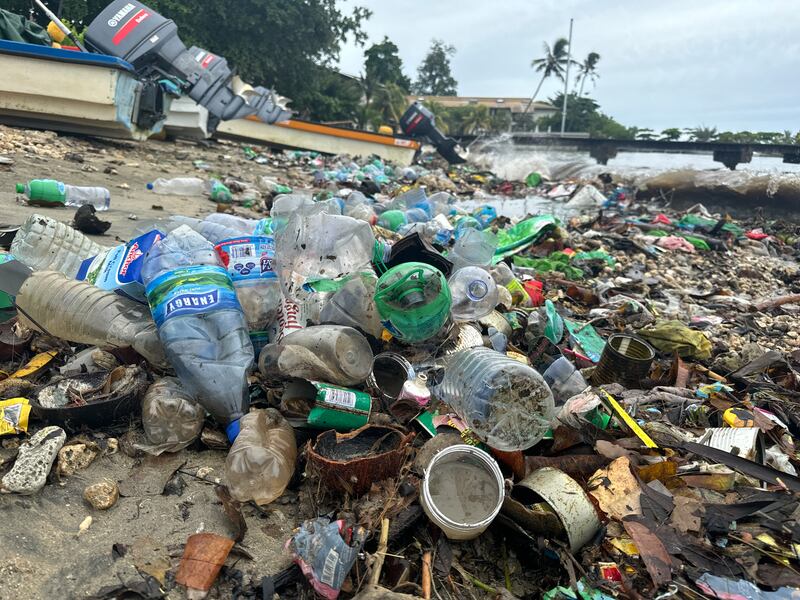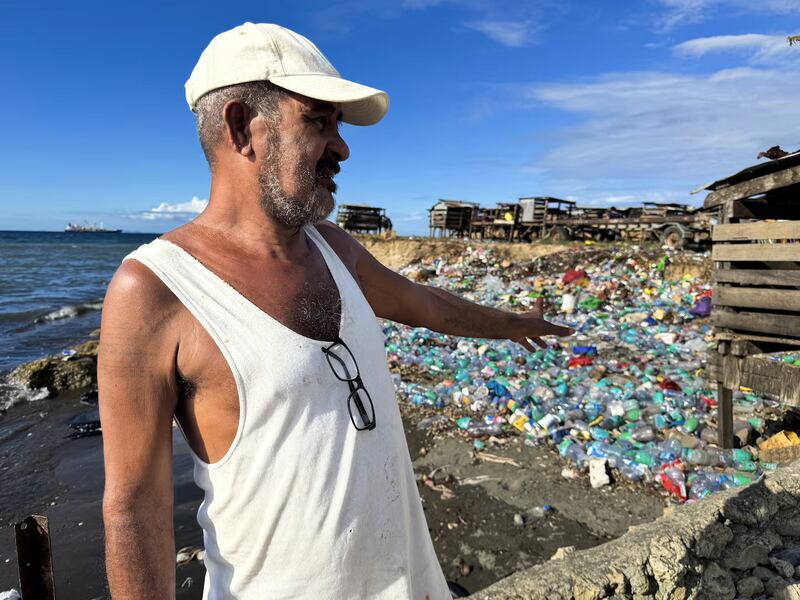Oil producers including Russia and Saudi Arabia have slowed negotiations for a plastic pollution treaty to a crawl, dimming chances that an agreement to tackle a burgeoning environmental and health threat can be reached this year.
Negotiators from dozens of countries are meeting in Busan, South Korea, this week for what critics of the plastics industry hope will be the final negotiations for a treaty that paves the way for limits on plastics production. However, oil states appeared intent on blocking or delaying progress. Most plastics are derivatives of crude oil and natural gas.
Convenient and cheap, plastics are produced in ever growing volumes and found in every nook and cranny of daily life – from the flimsy stools at street food stalls in Southeast Asia to the componentry of sophisticated smartphones and the hundreds of billions of water bottles and plastic bags discarded worldwide every year after just seconds of use.
Mostly unrecycled, plastic waste has a lifespan of centuries and is exacting an increasing toll on the environment including in the oceans where it injures and kills marine life. A growing body of researchlinks plastics and their additives, which provide properties such as flexibility and color, to health problems including cancers, birth defects, reduced immunity to disease and hormonal disorders.
Campaigners say an effective treaty should address the source of plastic pollution and not only management of the swelling amount of plastic waste. That approach involves reducing the production and use of plastic through steps such as banning particular pernicious types, redesigning packaging and other measures. There are also calls to mandate the phasing out of chemicals linked to health problems.
After two years of negotiations led by the United Nations Environment Programme, or UNEP, some activists say the risk is that only a toothless agreement is produced. The UNEP had touted the Busan meeting as the final round of negotiations but Russia, Saudi Arabia, as the representative of a block of 22 Arab states, and India, which is a net oil importer but has aligned itself with the oil producers, are insisting on unanimity for every substantive issue.

At the opening session of this week’s negotiations, the Russian and Saudi Arabian envoys warned other delegates against invoking a rule that would allow a vote on the treaty if consensus isn’t reached.
Russian representative Dmitry Kornilov and Saudi Arabia’s Eyad Aljubran threatened to mire the negotiations in procedural issues if their demands were ignored.
“We would like to again remind you that all decisions on substantive issues within the framework of the meeting must be taken by consensus,” Kornilov told the hundreds of conference delegates.
“Now, if any of the delegates decides to reopen [this issue], we reserve the right to revisit the rules of procedure,” he said.
Russia and Arab nations also rejected a draft treaty text put forward by the chairman of the negotiations as a circuit breaker. Negotiators have been working with a 70-page document that contains nearly 1,900 sets of brackets encapsulating all of its disputed words and sentences, which Russia and its supporters want to remain the basis for negotiations.
The threats are part bluster “backed up by the ability to waste time because they have no desire to see an actual treaty,” said Melissa Blue Sky, a senior attorney at the Center for International Environmental Law and observer at the negotiations.
‘Huge distances’
International Energy Agency forecasts for crude oil demand suggest that plastics will become more financially crucial to petrochemical companies and oil-exporting nations as increased adoption of electric and hybrid cars reduces demand for fuels.
At the second round of treaty negotiations in mid-2023 in Paris, the petro states managed to derail negotiations for several days by talking about procedural issues. The delaying tactics have continued during the closed door sessions of the current negotiations, Blue Sky told Radio Free Asia.
“There’s still huge distances between what most countries want and what the least ambitious countries want. And so the question is, are the majority of countries willing to stand up for a treaty that has substantial provisions and obligations,” she said.
“If the majority of countries who want an actual treaty, not just a voluntary waste management cooperation agreement, if they are not willing to stand up for certain provisions, then the treaty we end up with is a treaty that even the least ambitious countries can agree to, and it will do very little.”

On Wednesday, the chair of the negotiations, Luis Vayas, said after three days there had been only “limited” progress toward a treaty and time was running out to conclude an agreement.
Colombia’s vice minister of environment, Mauricio Cabrera Leal, said a number of countries were acting in bad faith and deliberately stalling the negotiations. He did not specify which countries.
Representatives of India, Russia and Iran said a shortage of time for negotiations should not be a reason to force through an agreement without consensus.
At least 400 million tons of plastic are produced each year, according to recent industry data, a more than 200-fold increase since the early 1950s. Based on Organization for Economic Cooperation and Development estimates, about three quarters of it becomes waste and nearly a fifth is so-called mismanaged waste - burned, discarded on land and in waterways or left in open dumps and substandard landfills.
The burden of dealing with the profusion of plastic is greatest in lower income countries with little or inadequate infrastructure for processing garbage.
‘Unbearable’
In the Solomon Islands capital of Honiara in the South Pacific, a reporter this week documented discarded plastic clogging its shoreline and countless plastic bottles filling its waterways.
The ubiquity of the waste is despite a government ban, announced in 2023, on single-use plastics such as shopping bags, straws, polystyrene takeaway containers and water bottles smaller than 1.5 liters.

In Cimahi, a city of half a million people in Indonesia’s West Java province, resident Saifal said problems stemming from plastic pollution occur on a near daily basis.
“Single-use plastics end up in drains, causing constant flooding and leaving garbage scattered on the streets during heavy rain,” said Saifal, who goes by one name.
“At night, neighbors often burn trash that contains plastic. The smell is unbearable,” he told BenarNews.
Indonesia, which is one of the largest sources of plastic pollution in the ocean, has been intensifying its efforts to control plastic waste but challenges remain, said Vinda Damayanti, director of waste reduction at the Ministry of Environment and Forestry.
A ministerial regulation requires producers in industries such as manufacturing, hospitality and retail to reduce waste by redesigning packaging, reusing materials and enhancing recycling, Damayanti said.
The ministry is also advocating for a nationwide ban or fees for single-use plastic bags after success there with such measures.

Indonesia wants an international framework on plastic waste to ensure that developing countries have access to funding and technology that will help deal with the problems, according to Damayanti.
“Many people don’t understand the environmental damage caused by plastic waste,” she said.
“This is a global problem that requires a global solution.”
Edited by Taejun Kang.
